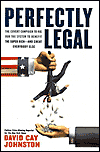|
Compare this to this. Interesting differences, yes? I completely agree with Bruce. First, does anyone really believe that the TSA needs all "72 airlines[' ...] June 2004 domestic passenger flight records" in order to test their system? Assuming the system were verifiable, a sample of real data would be sufficient. Second, how will they know the difference between a successful test and a failed test? Did they catch a set of actual terrorists through other means in June 2004, so that they have a group of expected true positive matches? Seems unlikely, given the publicity that each minor incident has raised. No, the purpose of the TSA test is not to verify their system -- such verification isn't possible, and if it were, all 72 airlines would not need to participate for a valid test sample. The real test the TSA is running is whether or not the airlines will comply, and how badly the public will freak out. The airlines have complied -- test 1 passed. So, onto test 2. This would be a great time to write your congresspeople and freak out. Matt Haughey is getting beaten up in the comments of his post about ad banners coming to TiVo, but he's absolutely right to complain about TiVo's move. This is a big deal, yet another chapter (along with the recent TiVo-to-Go and Macrovision moves, and others in the past) in the "two masters" problem for TiVo. TiVo's original pitch was that it transformed television viewing for the audience -- here are the set of features that you want to make it "TV your way." Most prominent among these features was ad-skipping -- certainly the reason I bought a TiVo. Ad banners during ad-skipping are, at the very least, an odd choice, and they dilute and poison the "TV your way" message. Matt's detractors have claimed that sophisticated TiVo users will be able to get around the new feature with the undocumented 30-second skip command, but they miss the point. Jeff Bezos apparently likes to say that Amazon always tries to "delight the user" with the site's features; similarly, Steve Jobs talks about "lickable" user interfaces. Don Norman's recent book "Emotional Design" talks in depth about the emotional reactions great products give us. TiVo is still usable with banner ads, and it may still be possible for power users to avoid them altogether, but by any interpretation, a person who bought a TiVo to skip ads will not be delighted to see banner ads in their place. They will be annoyed. Open source projects are often spurred by developers trying to "scratch an itch" they personally feel. TiVo has just spread Acme itching powder all over their product. With competition from above in the form of cable company DVRs, and from below in open source DVRs, is that really the right move? Do they expect the revenue from their banner ads to cover the potential lost revenue from users who come to distrust their motives? TiVo is still thinking like a small company that has no option but bare survival. They should start thinking like a fighter. If they don't fight for their users, they will wind up fighting with their users, and that's a fight they'll lose.  I'm off for a couple of weeks vacation to New Zealand. Marc has
graciously agreed to guestblog for me. He did a
great job last time, I'm looking forward to seeing what he writes!
I'm off for a couple of weeks vacation to New Zealand. Marc has
graciously agreed to guestblog for me. He did a
great job last time, I'm looking forward to seeing what he writes!
I'll be offline relaxing and travelling up and down the country. I'm amazed to learn it's only three time zones away from California.
Since Nelson and I have both been grousing
about Mac OS X's Terminal.app, I did some more research.
Command-doubleclick will open an URL in Terminal.app, but only if the
URL is one line long. Here's a better solution:
Update: I updated the suggested "word" line after finding a few holes and resorting to reading RFC 2396. I omitted '!', "'", "(", and ")" because I think those would cause more parse errors than they would solve in this context.
I have to say I found this
summary of the White House reaction to TIME
Magazine's article about Raven Rock, Dick Cheney's previously
"undisclosed location," pretty hilarious.
Let me just state for the record that if Apple were to
release a car stereo head unit, I would be first in line to buy
it. I would even replace my old, 2G iPod with a shiny new iPod at
whatever price they asked. Steering wheel controls would be nice, but
really all I need is a head unit with an iPod socket and nice
controls. Let's call it the iDash.
The car/iPod interface has been the worst part of the iPod experience -- getting the iPod music playing out of the car speakers is ridiculously hard, and just finding a place to rest the iPod while it plays is comic. I've tried using cassette adapters, which fake out the tape deck into playing iPod tunes, but they have consistently died on me, either fraying at the cable that dangles out of the deck or frying in the heat (just like a real cassette!). I've tried using mini FM transmitters like the Griffin iTrip, but the sound quality is terrible and finding a free radio channel in the Bay Area is impossible. (I had one for a while, until some anti-enterprising San Franciscans launched a pirate radio station on it.) I've tried removing the CD changer and using an RCA adapter to wire the iPod in directly, which, modulo the cables trailing from the trunk to the front, was great for sound and stability -- until the damn thing shorted out and took the turn signals, gas gauge, and brake lights with it, a $600 repair. Now I'm back to the cassette adapter, and I pack it into my bag every day as I head out of the car. What a pain. Too many head units don't provide auxiliary input, and all the solutions on the market are half-assed and clunky. A fantastic Apple head unit would be an amazing tool for the iPod, and would really change the car stereo experience. Microsoft wasted a bunch of money on car PCs a few years ago. Wouldn't it be funny if the iDash gave Apple a entry point to automotive computing?
Mark Frauenfelder blogged
today about the Iowa
Electronic Markets (IEM), a futures market run by the University
of Iowa for studying predictions of political elections and other
events. I love the idea of these markets and have been following them
closely. While the Policy
Analysis Market caught some well-deserved criticism last summer, I
didn't think it was a crazy idea, but that it was more poorly explained than
poorly conceived.
I was following the IEM during the Democratic Presidential primaries, and was disappointed with the results of what I saw. These markets are sometimes claimed to "predict the future," and rightly so in that they can expose upcoming events that are for whatever reason non-obvious by conventional wisdom. It was not obvious to me that Howard Dean would suffer such an upset in the Iowa Caucuses, placing behind Kerry and Edwards when all the polls were showing a different result. After the shoes had all fallen, I went back to the IEM to see if these futures markets -- based, after all, in Iowa -- had been able to predict what many of us had missed.
No one has claimed predictive markets are perfect, nor that they can forecast everything -- just that they tend to outperform other predictive measures. I'll be interested to see if this idea takes greater hold over time, and gains in effectiveness as it involves more participants.
It's interesting to read about Accenture and the award of the "Virtual
Border" contract from the Department of Homeland Security. This
Reuters article, like a recent NY Times
article on the same topic, talks about the attempts by the House
of Representatives to prevent Accenture receiving the contract, since
Accenture's corporate headquarters is not in the US -- it is in
Bermuda.
I do think this is an interesting and important issue, and I'm glad to see the House taking some action on it. Update: The article in Thursday's Times has a somewhat better explanation of the issue.
I had a fine time watching the new Harry Potter
movie last weekend -- you know it's a better movie when it
features a
tree with more personality than some of the characters in the
earlier episodes -- but was driven further down the road of hating
movie theaters, which once I loved.
Movie theaters are increasingly hostile environments. At this one showing, we had:
It would certainly be cheaper to buy the movie on DVD and own it forever, than to watch it once for nearly twice the price; the popcorn would be better, cheaper, and faster, and could be topped with real butter instead of "topping"; the water would be tastier, colder, and available for $1.49 per 100 cubic feet; and the talking would be sanctioned or actionable. Plus, no ads. It's no wonder home theater is booming.
How is it possible for this
article to make it into the New York Times a mere 11 days after this
article without making a connection between them? (Of course, the audience
is storming the projector on many more than just these two fronts.)
|
||


